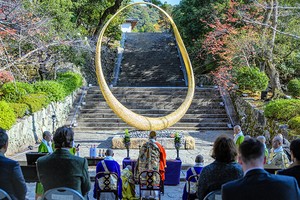THE ASAHI SHIMBUN
May 29, 2024 at 16:29 JST
 A panel of experts set up by the labor ministry holds a meeting in TokyoŌĆÖs Chiyoda Ward on May 28. (Ayami Ko)
A panel of experts set up by the labor ministry holds a meeting in TokyoŌĆÖs Chiyoda Ward on May 28. (Ayami Ko)
The central government has decided to drop an eligibility rule to expand coverage of the employeesŌĆÖ pension system for part-time workers and nonregular employees.
The goal is to increase the number of enrollees in the employeesŌĆÖ pension system and address the problem of relatively low pension benefits for nonregular workers.
The government intends to submit related legislation to the ordinary Diet session next year.
Currently, the main targets of the employeesŌĆÖ pension plan are full-time company employees.
Part-timers and other nonregular workers are eligible only when they ŌĆ£work at least 20 hours or more a week in a company with 101 or more employees and earn at least 88,000 yen ($560) a monthŌĆØ or ŌĆ£work at least 30 hours a week in a company with 100 or fewer employees.ŌĆØ
The government has decided to abolish the requirement of company size of ŌĆ£101 or more employees.ŌĆØ
The public pension system is described as a ŌĆ£two-story structure.ŌĆØ
The ŌĆ£first floorŌĆØ consists of the national pension plan, in which the full amount of the flat-rate basic pension is about 68,000 yen per month.┬ĀThe ŌĆ£second floorŌĆØ is the employeesŌĆÖ pension system.
The government has long been trying to increase the number of participants in this system to further ŌĆ£top upŌĆØ pension payments.
In 2022, the government reduced the size of eligible companies from ŌĆ£501 or more employeesŌĆØ to ŌĆ£101 or more.ŌĆØ
From October this year, the ŌĆ£101 or moreŌĆØ will be changed to ŌĆ£51 or more.ŌĆØ
According to an estimate by the labor ministry, the number of workers eligible for the current employeesŌĆÖ pension plan is 46.1 million. Once the size requirement is completely abolished, 1.3 million workers will be newly eligible to join the system.
However, since premiums are split 50-50 between labor and management, small and medium-sized companies will bear a burden.
A study group under the welfare ministry has urged the government to offer support to these businesses.
The government intends to incorporate the change into the basic policies for economic and fiscal management and reform, which is expected to be finalized in June.
It will also promote the expansion of coverage for those who work at private establishments.
Currently, companies in only 17 industries, including manufacturing and the legal profession, are required to enroll in the employeesŌĆÖ pension plan if they have five or more employees.
The government will abolish this industry-based requirement and expand mandatory enrollment to include the agriculture industry, hair and beauty industries, among others.
The government will conduct a fiscal analysis of the public pension system this summer to check the outlook for the level of pension benefits.
Based on the results, the pension system will be reviewed, including expansion of eligibility for the employeesŌĆÖ pension system.
(This article was written by Ayami Ko and Tamiyuki Kihara.)




















A peek through the music industryŌĆÖs curtain at the producers who harnessed social media to help their idols go global.
A series based on diplomatic documents declassified by JapanŌĆÖs Foreign Ministry
Here is a collection of first-hand accounts by ŌĆ£hibakushaŌĆØ atomic bomb survivors.
Cooking experts, chefs and others involved in the field of food introduce their special recipes intertwined with their paths in life.
A series about Japanese-Americans and their memories of World War II